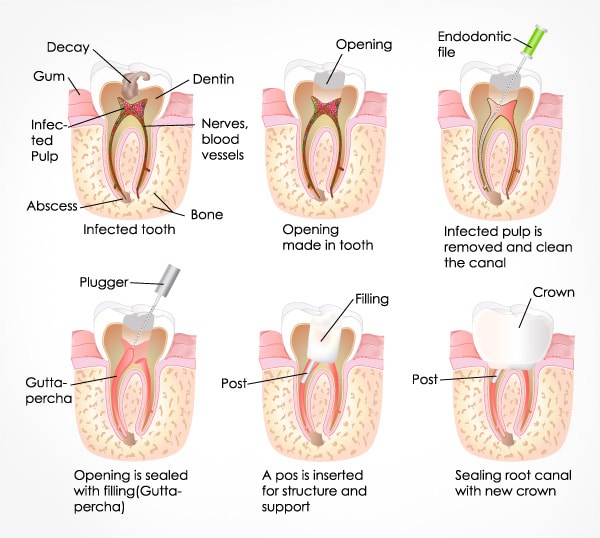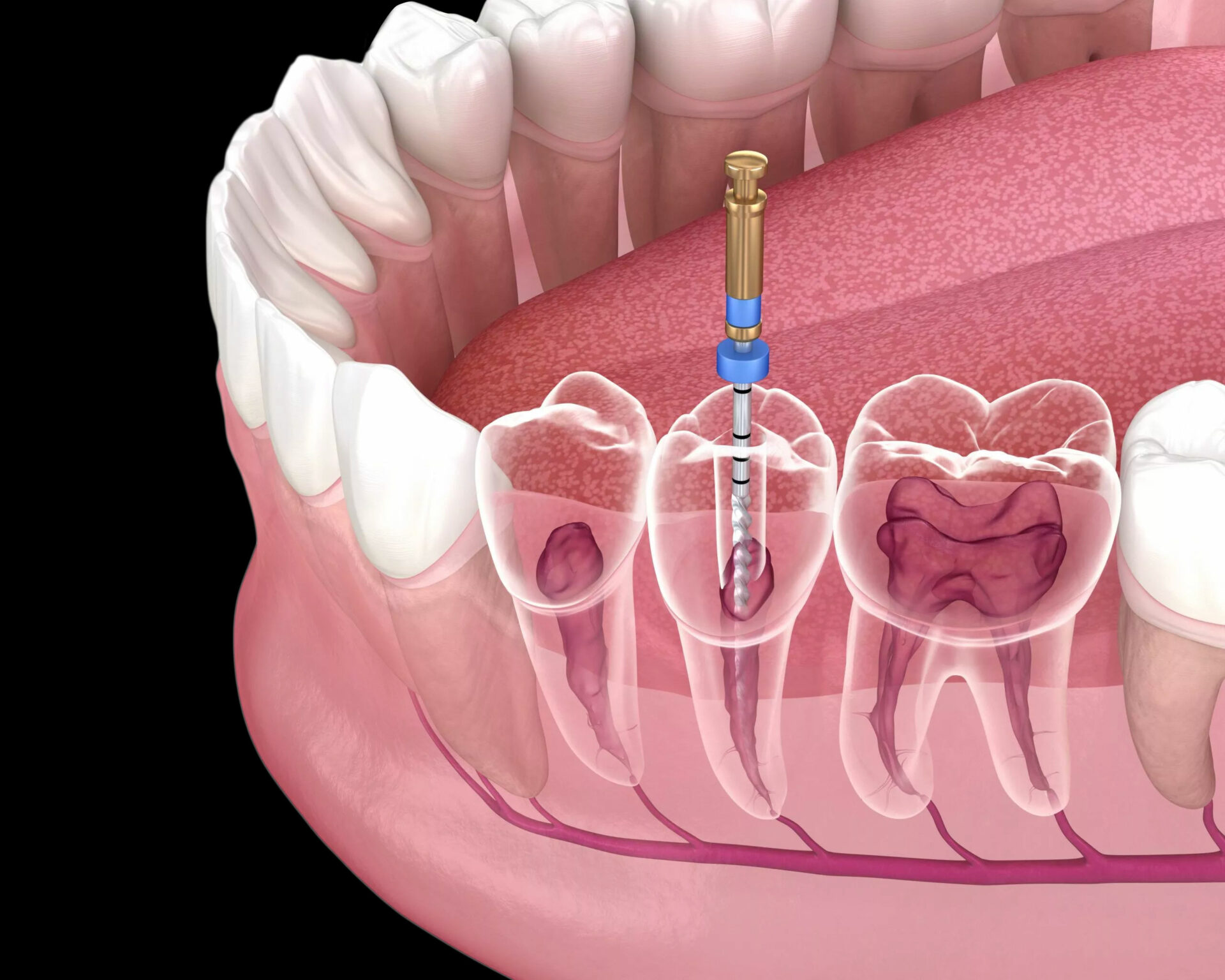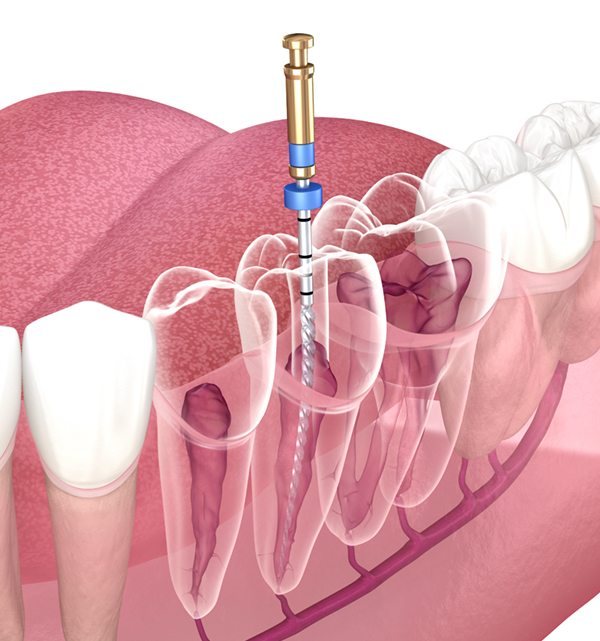
Root Canal Treatment
Root canal treatment, also known as root canal therapy (RCT) or endodontic treatment, is a dental procedure that involves drilling into a decayed tooth, with the aim of removing the soft centre, ‘dental pulp’.
This pulp consists of connective tissue, nerves and blood supply, and continues into the root of the tooth – removal of this soft centre is crucial in preventing further damage
Depending on the tooth, a crown replacement might also be involved – this is where the surface of a tooth, used for chewing, is also replaced.
Trusted by over 2,00,000 Happy Patients
Do I Need Root Canal Therapy?

Generally, root canal treatment is advised when the pulp of a tooth (and the blood vessels and nerves within) is damaged or infected by events such as dental trauma, deep decay, cracks and chips . If you are wondering whether or not you might need a root canal, there are a few things to consider. These will include the current condition of your teeth, and whether any are badly decayed.
Determining the current condition of your teeth is an important step to take in managing oral health in the first place.
Consider your dental history – this means thinking about how often you perform dental care like brushing your teeth, and even knowing whether you have had previous instances of infection or have a history of dental work.


Next, if you are experiencing any severe pain, this can be another indicator of damaged, dead or infected teeth. If your tooth hurts with pressure, it is important to get the opinion of a professional, as more problematic issues may be a cause. Ultimately, the best way to understand the current condition of your teeth is to visit your specialist for a checkup.

More specifically, signs of a pulp infection occurring include discomfort and pain in and around the tooth and gums, sensitivity to hot or cold temperature, and swelling of the gums or face. If you are experiencing these symptoms, your dentist will likely recommend root canal treatment in order to remove the diseased pulp and clean and seal the root canal system.

Many times tooth is necrosed and no pain at all....still root canal is only solution to save the tooth.
Our experts will give post-operative instructions, so as to minimize the risk of bleeding and pain. You can also discuss about your concerns at this time, with our expert.
The Benefits of Root Canal Treatment
When it comes to the benefits of root canal treatment, there are many.
Firstly, it allows you to keep your natural tooth – this in itself has a number of benefits, including that it will always feel and perform better than a denture or implant. It works better in regard to chewing, and will limit the likelihood of future dental costs and procedures.
Secondly, root canals are fairly pain free with little discomfort – when compared to other dental procedures such as a natural tooth extraction, a root canal procedure is often entirely painless. This is thanks to modern dentistry technology, local anaesthetic which will numb the area, and the expertise of endodontists at a good specialist practice.
Additionally, a root canal procedure is quick and cost effective – as explained below within the section on what happens during a root canal procedure, the root canal process is usually more efficient than a tooth extraction. Not to mention, if you have a dental plan included within your medical coverage, the treatment might be covered.

The Dangers of an Untreated Dental Infection
In addition to having an understanding of the benefits surrounding root canal treatments, it is also important to understand the risks that come with leaving an infected or damaged tooth untreated.
Firstly, a tooth abscess or root canal infection will almost definitely require treatment – root canal therapy is in many cases the best approach to take in fixing a tooth abscess (when bacteria enters the pulp chamber and multiplies).
If left untreated, a tooth abscess can result in a range of problems, from severe pain, discomfort and nerve damage, to pus and dead tissue debris filled swelling, facial swelling and tooth discolouration.
Furthermore, if untreated, bad cases can see the root canal infection spread from the mouth area. It is also worth noting that an infected tooth may impact teeth that have had prior dental work. As a result, treatment is crucial if you have a tooth abscess or infection.
Ultimately, if you need a root canal procedure, don’t put it off. Leaving treatment of infected teeth too late will often require the tooth to be pulled. If left untreated for longer, you are at risk of running into further oral problems that could potentially last a lifetime.
What Happens During a Root Canal Procedure?

Within procedures surrounding root canals, Australian Dental Specialists undertake set processes that involve broader tasks such as an x-ray and general consultation, as well as the more specific stages within the performance of root canal treatment on a tooth.
Firstly, your specialist will identify the problem at hand, and will subsequently take x-rays of the relevant tooth and the area around the tooth.
Following this x-ray process, when it comes to the procedure itself, the tooth area will be numbed with a local anaesthetic. In addition to this, your tooth may be covered with a rubber dam or sheet, which isolates the relevant tooth from the rest.
When it comes to the removal process, the dental practitioner will remove the diseased pulp inside and clean and seal the tooth root canal system. The pulp chamber is accessed from the top of the tooth, and once cleaned, the root canals are filled with a natural latex material called gutta-percha.
Finally, the tooth will be sealed, either with a filling or a crown. Often, a temporary filling will be used to seal the hole, which will be replaced with a permanent one once the root canal has healed.
The treatment can be completed in one or two visits depending on the difficulty in each case.
Once root canal treatment is completed, dentist will decide on what type of restoration is necessary to protect your tooth.
How Can I Avoid Root Canal Treatment?
When aiming to avoid root canal therapy, there are a number of things you can do.

Clean your teeth regularly – this means brushing your teeth two times a day, and flossing daily.
Wear a mouth guard when necessary – if you play a sport that might warrant the use of one, or grind your teeth as you sleep, a mouth guard is a great way to protect your teeth.
Ensure that you have regular tooth checkups and cleanings – this also means getting any tooth problems checked out by your dentist as soon as possible.
Avoid or limit hard foods within your diet – this might include candy and lollies, or even ice, which can cause cracks and fractures in teeth and fillings.
Avoid or limit sugary and acidic food and drink – for example, soft drinks can break down your tooth enamel and attract bacteria.
Ultimately, preventing root canal treatment (and the problems that make it necessary) is the best way to save yourself hassle, pain, money, time and medical problems. As a result, getting yourself into these habits and ensuring that you are taking the appropriate precautions is crucial in avoiding root canal treatment naturally.

